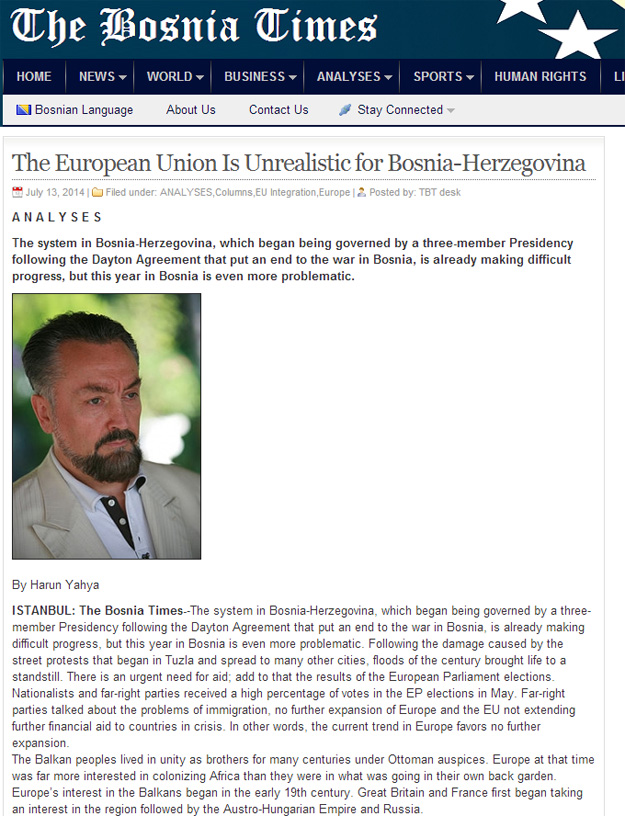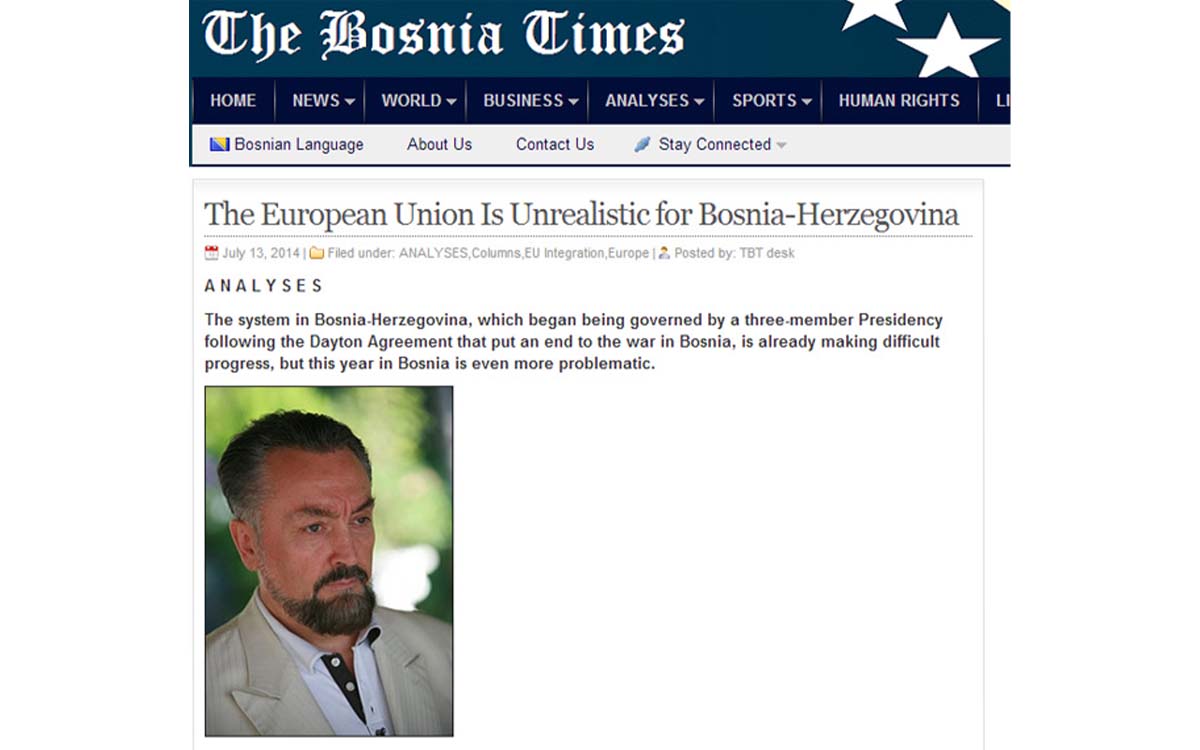
The system in Bosnia-Herzegovina, which began being governed by a three-member Presidency following the Dayton Agreement that put an end to the war in Bosnia, is already making difficult progress, but this year in Bosnia is even more problematic. Following the damage caused by the street protests that began in Tuzla and spread to many other cities, floods of the century brought life to a standstill. There is an urgent need for aid; add to that the results of the European Parliament elections.
Nationalists and far-right parties received a high percentage of votes in the EP elections in May. Far-right parties talked about the problems of immigration, no further expansion of Europe and the EU not extending further financial aid to countries in crisis. In other words, the current trend in Europe favors no further expansion.
The Balkan peoples lived in unity as brothers for many centuries under Ottoman auspices. Europe at that time was far more interested in colonizing Africa than they were in what was going in their own back garden. Europe’s interest in the Balkans began in the early 19th century. Great Britain and France first began taking an interest in the region followed by the Austro-Hungarian Empire and Russia.
European countries despised the Balkan peoples for many years. The term “Balkanization” was used to mean “backwardness, primitiveness, barbarity and fragmentation.” When Europe began expanding its relations with the Balkans, they also began expressing their opinions of the region in writing. One common feature among the Western writers and thinkers writing about the region since the 14th century - such as the Catholic chronicler Ulrich of Richenthal, H. Charles Wood, Hermann Graft Keyserling, Maria Todorova, the American John Gunther and others - was their contempt for the people of the region.
The West originally looked at the Balkans as an extension of the Ottoman Empire in Europe. They then adopted the word “Balkan” for the region, also used in the Ottoman Empire, and meaning “mountainous or forested.” As the West became acquainted with the region it began implementing the strategies it had applied in their colonies across the world.
In order to take control of a country or region, Western states first divide that country or region into smaller parts; it is much easier to control these fragmented splinters because these countries that are broken away from the motherland by means of nationalist discourse and are economically, politically and militarily weak always want to line up alongside a stronger power. It is far easier to control several small, weak and fragmented countries than one powerful country distributed over a wide geography.
Looking at world history, the main strategy of the West has been one of divide and rule. The Balkan Wars and First World War in the early 20th century - both of which started in the Balkans and spread across the world - led Europe to be guarded in their approach towards the Balkans and they built their policies around the Balkans’ risky, cosmopolitan structure. The reason why the West remained silent during the civil wars, massacres and cruelty as Yugoslavia fell apart is this structure in the Balkans.
The Balkan countries declared independence one by one as Yugoslavia disintegrated. The EU was unable to create a solution to the Balkan problem as a union during the wars that followed independence. The events in the region only came to an end following military intervention, albeit belated by the NATO and the USA, and the EU began to act to ensure security and order in the region after that intervention.
Although the EU refers to a Union, the countries comprising it have always adopted their own individual strategies. For example, Great Britain and France sought to put a brake on Germany’s close relations with Croatia and Slovenia during the process of fragmentation, relations which they did not enjoy. Despite the strong opposition of these two countries, Germany immediately recognized these two countries when they declared independence in 1991, and raised the bilateral relations that had begun in secret to a much higher level.
When Russia’s relations with Serbia were added to these differences between the EU countries, it was quite normal for the problems in the Balkans to become incapable of resolution. Instability is the only possible outcome in an environment containing such widely different elements of balance. Looking at all this, it is clear that the cause of the unease in the Balkans is not the peoples of the region, but stems from the Western countries’ own power struggles with one another.
The most important problem within the EU today is that there is no real union. The countries are most certainly not of one mind on subjects such as the economy, money, energy, migration and foreign policy: Ukraine, on its way to rapprochement with Europe, is the most glaring example of the overall weakness of the EU. Ukraine, where those favoring closer relations with Europe came to power, lost the important region of Crimea, while it currently faces serious socioeconomic problems and civil conflict in the east.
Identical protests to those in Ukraine occurred in Sarajevo. Although there were serious problems resulting from incidents that started in Tuzla spreading to other cities, the country is now quiet. Young Bosnians need to know that the solution to the country’s problems does not lie in migrating to Europe en masse or in joining the EU. It must not be forgotten that in the days of the infamous Srebrenica Massacre, which lasted for several days and resulted in thousands of martyrs, the countries of the EU did nothing to help, while Turkey, under the leadership of the late Necmettin Erbakan, supported its Bosniak brothers with all its might. Turkey continues to support Bosnia in many areas, and will continue to do so in the future.
The Balkans and Bosnia never enjoyed genuine peace and security after the Ottoman Empire. The Muslim people of Bosnia, subjected to systematic ethnic cleansing under Yugoslav rule, suffered slaughter and rape that will go down in history during the three-year war that followed its declaration of independence. Although the EU might look like an attractive solution to the young people of Bosnia, the Bosniak people will never forget how Western countries remained abysmally silent in the face of what happened in the country during the three-year war. The rising tide of ethno-nationalism in Europe is another problem for Bosnia.
The road to peace and tranquility in Bosnia goes through the youth being aware of national heritage and spiritual values. Of course joining the EU would be a great achievement for Bosnia and a major step towards achieving stability. However, a union of Muslim countries is the only way to a total solution. Developments indicate that the 21st century will be the century of the Muslim countries. Bosnia, on the old Ottoman border with Europe, will be this union’s base in Europe.
Adnan Oktar's piece on Bosnia Times:
http://www.thebosniatimes.com/en/european-union-unrealistic-bosnia-herzegovina/


